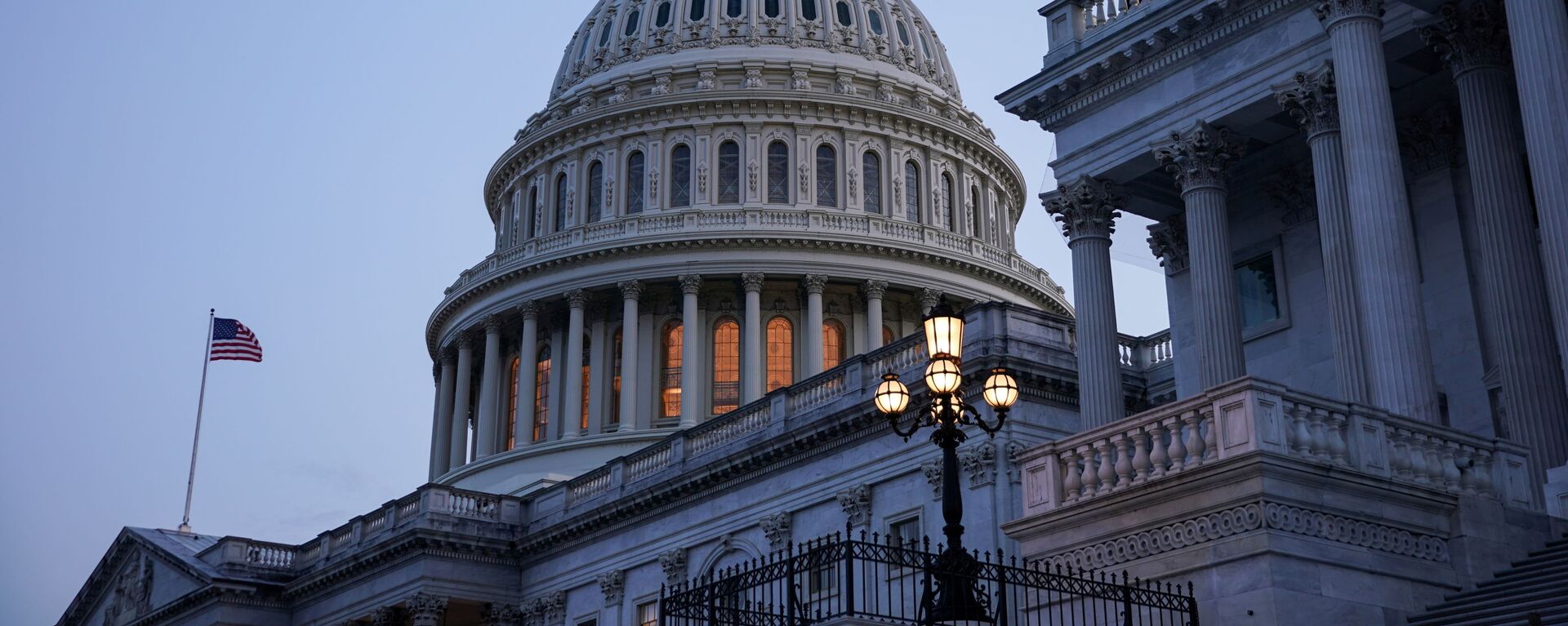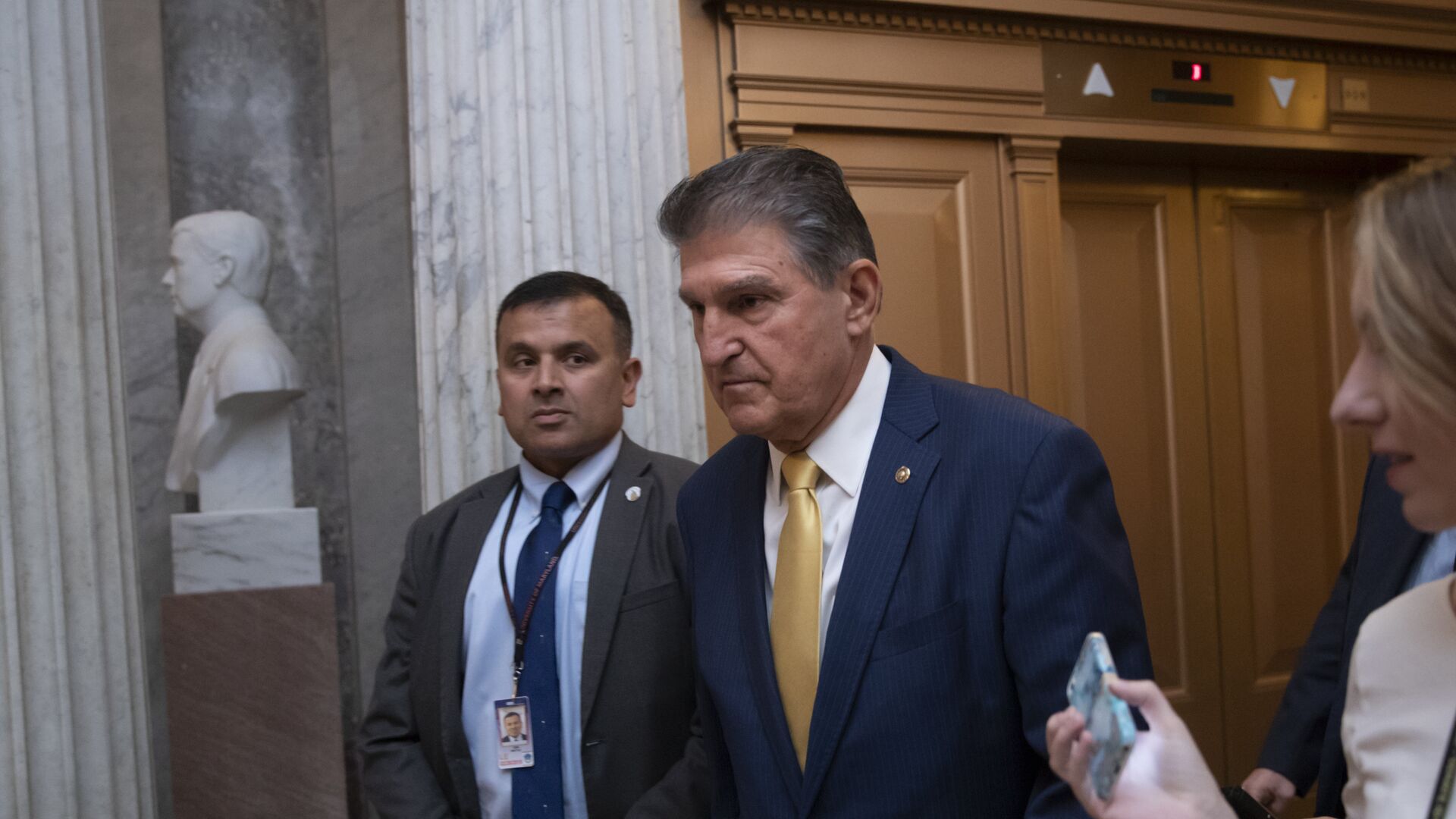https://sputnikglobe.com/20210912/rogue-democratic-senator-says-he-will-not-vote-for-bidens-35-trillion-budget-plan-1089012452.html
Rogue Democratic Senator Says He Will Not Vote for Biden's $3.5 Trillion Budget Plan
Rogue Democratic Senator Says He Will Not Vote for Biden's $3.5 Trillion Budget Plan
Sputnik International
Democratic lawmakers pushing the president's $3.5 trillion budget blueprint, which includes investment in climate initiatives, an expansion of Medicare and an... 12.09.2021, Sputnik International
2021-09-12T14:50+0000
2021-09-12T14:50+0000
2022-10-17T19:46+0000
joe biden
sen. joe manchin (d-west virginia)
spending
budget
https://cdn1.img.sputnikglobe.com/img/106864/50/1068645051_0:0:4296:2418_1920x0_80_0_0_bfbaac7a6df4e82edbe82fa62cf535cc.jpg
Senator Joe Manchin (D-WV) announced Sunday that he will not support President Biden's signature $3.5 trillion budget bill unless spending is pared down by more than half."We've already put out $5.4 trillion and we've tried to help Americans in every way we possibly can and a lot of the help that we've put out there is still there and it's going to run clear until next year, 2022, so what's the urgency? What's the urgency that we have? It's not the same urgency that we had with the American Rescue Plan", the rogue senator added, referring to the $1.9 trillion coronavirus stimulus package passed by Congress in March.In a separate interview with NBC's "Meet the Press", Manchin reiterated that Congress didn't "have the need to rush into this and get it done within one week because there's some deadline we're meeting or someone's going to fall through the cracks". He also argued that despite the assistance that's already been doled out, and in spite of an improving job market, there are still millions of vacancies. "We have 11 million jobs that we haven't filled, 8 million people still unemployed. Something's not matching up there", he said.Manchin's comments match sentiments he expressed in an op-ed in The Washington Post last week, where he called on his fellow senators to take a "strategic pause" on the legislation, and suggested that the US doesn't have "an infinite supply of money to deal with any current or future crisis".Republicans poured cold water on Biden's budget bill last week, with The Hill reporting that the GOP was looking to capitalise on the chaotic US withdrawal from Afghanistan and the negative political fallout it has generated for the president to scuttle the proposed spending.The $3.5 trillion spending package, to be spread out over ten years, includes $726 billion in proposed outlays for universal pre-kindergarten education, child care for working families, tuition-free community college, and primary care. It also includes $107 billion for border security and the provision of lawful permanent status for immigrants, an expansion of Medicare, an expansion of the child tax credit scheme, and more money for senior care. The bill proposes pumping $332 billion into the economy for housing affordability and rental assistance, as well as public housing initiatives, while devoting $19 billion toward clean electricity, and another $67 billion toward solar technologies, clean water, climate research, and clean vehicles. Tens of billions of dollars in additional cash has been penciled in for homeland security, investments in Native communities, small businesses, and Veterans Affairs facilities.The US government has already pumped over $6 trillion into the economy for COVID relief over the past year and a half, adding substantially to the nation's gargantuan federal debt, which reached $28.5 trillion in June. US federal debt surpassed the 100 percent of GDP mark in the spring of 2020, before the effects of the pandemic were even fully felt, with Fitch Ratings predicting that it will hit 109+ percent by the end of 2021.For the moment, the United States has been able to avoid substantial inflationary pressure and currency collapse over its government's money printing and debt accumulation activities due to America's status as the emitter of the dollar – the de facto world currency. However, a growing number of economists, bankers, and policymakers have recently expressed concerns that the current system cannot remain viable forever.
https://sputnikglobe.com/20210906/gop-reportedly-hope-to-scuttle-bidens-35-trillion-megabill-by-exploiting-chaotic-afghan-pullout-1083808931.html
Sputnik International
feedback@sputniknews.com
+74956456601
MIA „Rossiya Segodnya“
2021
News
en_EN
Sputnik International
feedback@sputniknews.com
+74956456601
MIA „Rossiya Segodnya“
Sputnik International
feedback@sputniknews.com
+74956456601
MIA „Rossiya Segodnya“
joe biden, sen. joe manchin (d-west virginia), spending, budget
joe biden, sen. joe manchin (d-west virginia), spending, budget
Rogue Democratic Senator Says He Will Not Vote for Biden's $3.5 Trillion Budget Plan
14:50 GMT 12.09.2021 (Updated: 19:46 GMT 17.10.2022) Democratic lawmakers pushing the president's $3.5 trillion budget blueprint, which includes investment in climate initiatives, an expansion of Medicare and an extension of child tax credits, among other goodies, need every vote they can get in the Senate, which is evenly split between Republicans and Democrats.
Senator Joe Manchin (D-WV) announced Sunday that he will not support President Biden's signature $3.5 trillion budget bill unless spending is pared down by more than half.
"[Senate Majority Leader Chuck Schumer] will not have my vote on the $3.5 trillion, and Chuck knows that, and we've talked about this", Manchin, known for his fiscal conservativism and the regular rejection of legislation pushed by his own party, said, speaking to CNN on Sunday.
"We've already put out $5.4 trillion and we've tried to help Americans in every way we possibly can and a lot of the help that we've put out there is still there and it's going to run clear until next year, 2022, so what's the urgency? What's the urgency that we have? It's not the same urgency that we had with the American Rescue Plan", the rogue senator added, referring to the $1.9 trillion coronavirus stimulus package passed by Congress in March.
In a separate
interview with NBC's "Meet the Press", Manchin reiterated that Congress didn't "have the need to rush into this and get it done within one week because there's some deadline we're meeting or someone's going to fall through the cracks". He also argued that despite the assistance that's already been doled out, and in spite of an improving job market, there are still millions of vacancies. "We have 11 million jobs that we haven't filled, 8 million people still unemployed. Something's not matching up there", he said.
Manchin's comments match sentiments he expressed in an
op-ed in
The Washington Post last week, where he called on his fellow senators to take a "strategic pause" on the legislation, and suggested that the US doesn't have "an infinite supply of money to deal with any current or future crisis".
The Democratic Party-controlled House of Representatives passed Biden's budget plan last month. In the Senate, however, the president's party requires the support of every single Democratic lawmaker, plus two independent senators caucusing with the Democrats, and at least one Republican.
Republicans poured cold water on Biden's budget bill last week, with
The Hill reporting that the GOP was looking to capitalise on the chaotic US withdrawal from Afghanistan and the negative political fallout it has generated for the president to scuttle the proposed spending.
The $3.5 trillion spending package, to be spread out over ten years,
includes $726 billion in proposed outlays for universal pre-kindergarten education, child care for working families, tuition-free community college, and primary care. It also includes $107 billion for border security and the provision of lawful permanent status for immigrants, an expansion of Medicare, an expansion of the child tax credit scheme, and more money for senior care. The bill proposes pumping $332 billion into the economy for housing affordability and rental assistance, as well as public housing initiatives, while devoting $19 billion toward clean electricity, and another $67 billion toward solar technologies, clean water, climate research, and clean vehicles. Tens of billions of dollars in additional cash has been penciled in for homeland security, investments in Native communities, small businesses, and Veterans Affairs facilities.

6 September 2021, 14:18 GMT
The US government has already pumped over $6 trillion into the economy for COVID relief over the past year and a half, adding substantially to the nation's gargantuan federal debt, which reached $28.5 trillion in June. US federal debt surpassed the 100 percent of GDP mark in the spring of 2020, before the effects of the pandemic were even fully felt, with Fitch Ratings predicting that it will hit 109+ percent by the end of 2021.
For the moment, the United States has been able to avoid substantial inflationary pressure and currency collapse over its government's money printing and debt accumulation activities due to America's status as the emitter of the dollar – the de facto world currency. However, a growing number of
economists,
bankers, and
policymakers have recently expressed concerns that the current system cannot remain viable forever.


